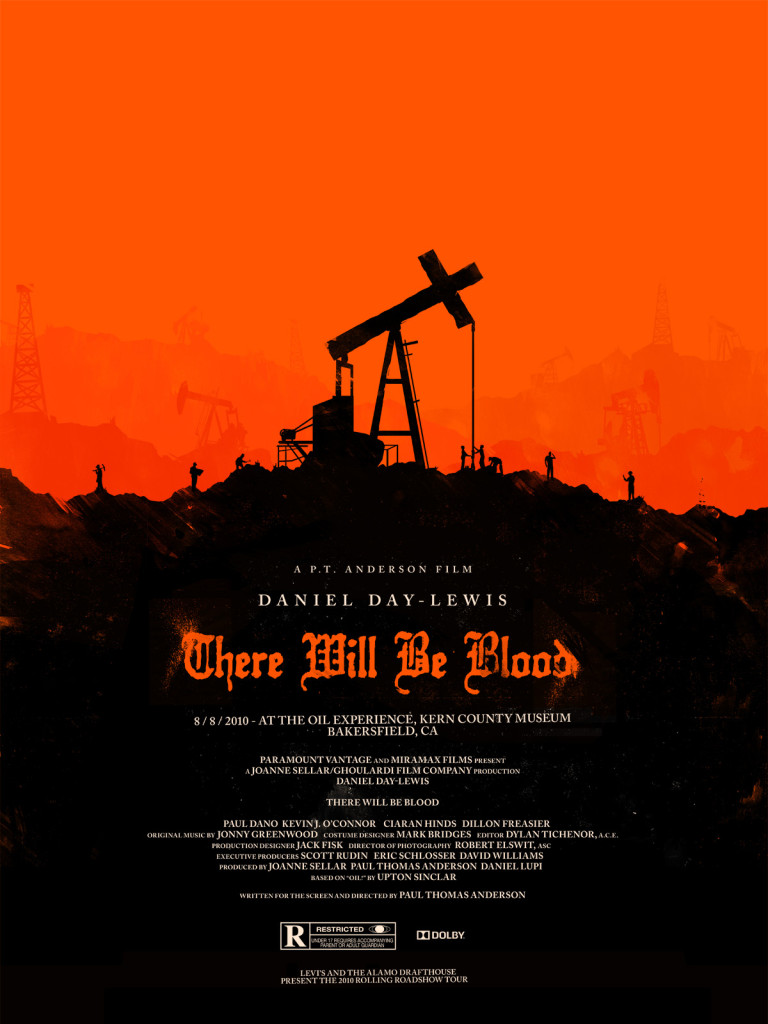There Will be Blood (written and directed by Paul Thomas Anderson, chosen as an Examiner Essential) is an epic film about Daniel Plainview, silver miner turned oil man. The story revolves around Plainview and his relationship with the world around him, made complicated by the fact that he needs other men to accomplish his goals, despite his growing distaste for his fellow man. He feels he can only rely on family, and even then, things get screwy.
Oil! (written by Upton Sinclair, himself chosen as a Pulitzer Prize winner) is an epic novel about J. Arnold Ross, mule driver turned oil man. The story, however, revolves around J. Arnold Ross Jr., affectionately called Bunny throughout the book, and his relationship with the world around him, made complicated by the fact that he strongly identifies with the growing labor movement of the early 1900’s, which butts heads directly with his life and upbringing as an American oil prince.
This is one of those adaptations where the source material is merely a starting point, the basis of a very different story. The complete opposite of movies like The Road or Watchmen, There Will Be Blood borrows a few characters, locations and themes, and then goes running off in an entirely different direction. A straight adaptation of Oil! would have resulted in a very long and very epic pro-Bolshevism film, as Sinclair wrote the novel as a condemnation of the industrial giants whose greed ensured that the laborers would receive little reward for their work, while the Fat Cats on top of the pyramid reap all the profits. The character of Bunny approaches the world in an inquisitive manner, and questions the actions of his father and his business associates. He becomes torn between his immense love and respect for his father, and his burning desire to bring equality to the masses. He starts the book as a smart and curious 13-year old, determined to learn the oil business as his Dad wishes him to, and he ends the book as a young adult, struggling to bring communism (and socialism) to the masses. Along the way, he goes to high school, and then college, meets a plethora of different and interesting people, dates a famous movie star (getting himself in the tabloids of the day), and learns the ins and outs of the oil game (which itself goes as far as political bribery and corruption at the highest possible levels).
For whatever reason, P.T. Anderson had no interest in this epic tale of the Haves and the Have Nots, and instead decided to focus on the pater familias. He even renamed the character, separating the two even more, and Daniel Plainview was born literally out of the earth in the middle of the desert. Whereas Mr. Ross treated his fellow men and workers fairly enough and was generally accepting of others, Mr. Plainview would just as soon cut the throat of anyone who stood in his path. On the surface he comes across as friendly enough, but he also has the ability to say what the other person wants to hear, in order to get his own way. He never brings up Bolshevism or the labor movement, and neither does his young son H.W. Plainview, who also has a very different character arc.
By changing the focus from the son to the father, and by eliminating much of extraneous ideas and themes of Oil!, Anderson ended up with a very different story. Not better. Not worse. Just different. Where Upton Sinclair lightly touched upon the hypocrisy of religious leaders and the role of religion in society, Anderson brought this to the forefront and made it a main point of contention with Daniel Plainview. Anderson takes the novel’s character of Eli Sunday and makes his Plainview’s foil – they constantly butt heads over money, and Plainview is put off by Sunday’s theatrics and ravings. Instead of a story about the wealthy exploiting the laborers, Anderson tells a story about a man who looks down on his contemporaries and harbors hatred for just about anyone and everyone, but most especially the willfully stupid and ignorant, as well as deceptive. Don’t cross Plainview, that’s for sure.
It would be fascinating to see someone actually try to make Oil! into either a movie or a television mini-series of some sort. Its a sweeping, epic story that actually makes the epic story of There Will Be Blood seem much smaller in comparison. After all, there is not even a mention of World War I, let alone all the political turmoil involving the burgeoning communist and socialist movements. A story of this scope needs lots of time and money to be told properly and There Will Be Blood‘s $25 million budget just wouldn’t cut the mustard. This film is a great example of inspiration via adaptation, one strong singular artist using the work of another strong singular artist as a starting point for something altogether unique and poignant.
Republished from my original examiner article, posted July 24, 2010.


 #571 – Young Godz
#571 – Young Godz Netflix pick for 3/2/15 – ‘The Way’
Netflix pick for 3/2/15 – ‘The Way’ Crespodiso Film School – Bruce Lee
Crespodiso Film School – Bruce Lee Review: ‘Central Intelligence’
Review: ‘Central Intelligence’
Leave a Reply
You must be logged in to post a comment.